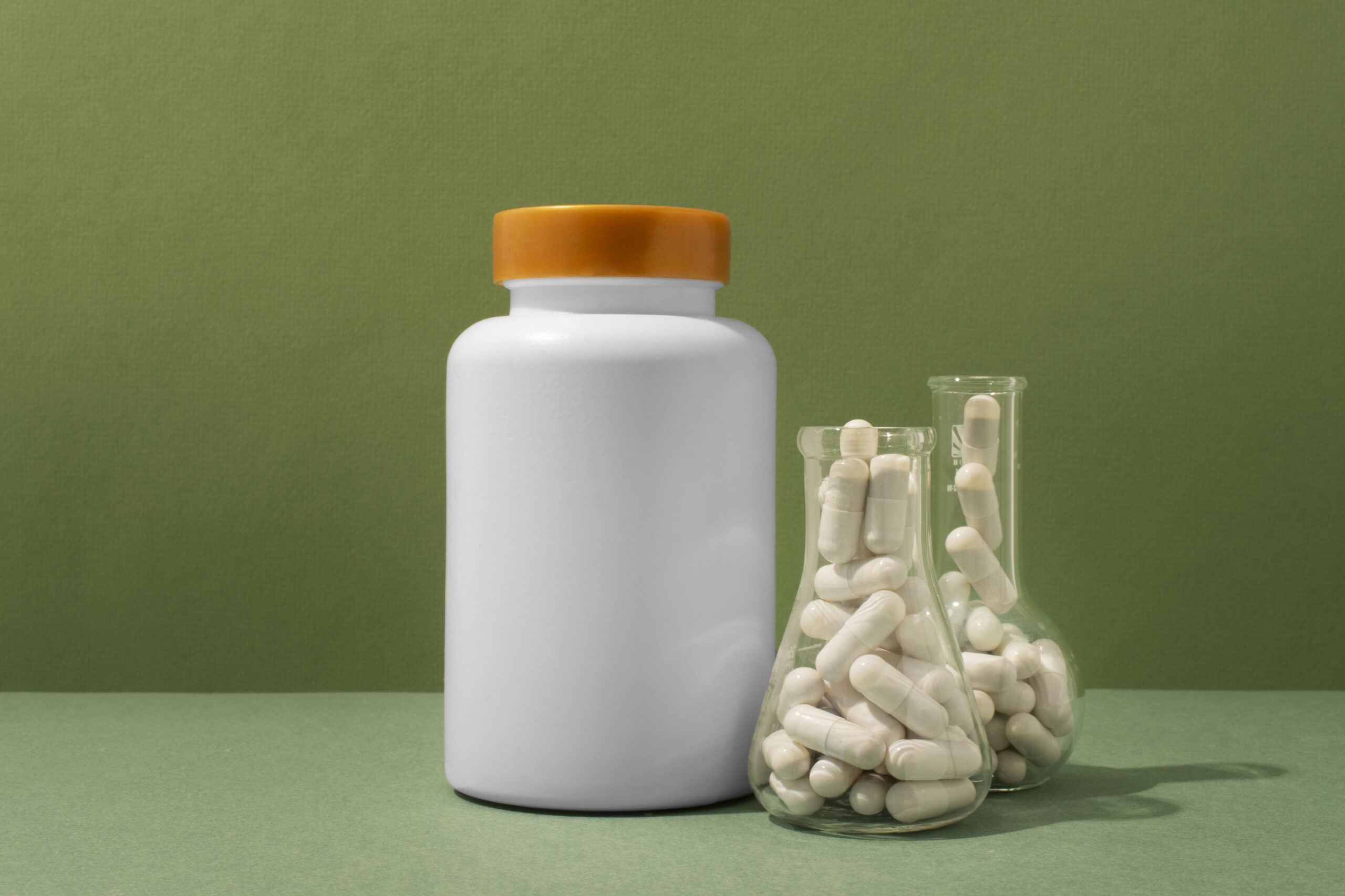Supplements are products designed to enhance or complement the diet by providing essential nutrients that may be lacking or needed in higher amounts. They can include vitamins, minerals, amino acids, herbs, and other substances. Supplements come in various forms such as pills, powders, capsules, or liquids. They are intended to support overall health, address specific deficiencies, or aid in managing health conditions. However, they should be used in conjunction with a balanced diet and not as a substitute for healthy eating or medical treatment.
A supplement is intended to be consumed in small, measured unit quantities and has a form that facilitates its dosing (e.g., tablets, capsules, dropper bottles, sachets of powder).

In the case of healthy people who follow a properly balanced diet, the widespread recommendation of supplements![]() is unjustified. The exceptions are vitamin D (according to current recommendations) and vitamin B12 (in the case of diets excluding animal products).
is unjustified. The exceptions are vitamin D (according to current recommendations) and vitamin B12 (in the case of diets excluding animal products).
Usually, taking dietary supplements may be considered in the case of![]() :
:
Every day, we all strive to feel and look our best. However, due to time constraints, we often struggle to prepare nutritious meals and eat at regular intervals. As a result, we resort to processed foods that are low in minerals and vitamins but high in saturated fats, salt, and sugar. Regularly consuming such foods, combined with insufficient sleep and constant rushing, can lead to nutritional deficiencies. In such circumstances, it is beneficial to consider taking supplements, as they can positively impact our overall health and well-being.
Symptoms![]() that can indicate deficiencies in the body include:
that can indicate deficiencies in the body include:
Of course, there can be many more symptoms, and everyone can experience different ailments, but these appear most often. It is worth mentioning here that constant fatigue is not your beauty but rather a sign of some negative processes occurring in the body.
Before choosing supplementation, it is worth analyzing your lifestyle and eating patterns to determine best what your body is missing.
The most common deficiencies are below.
Our bodies can only produce this vitamin in the spring and summer, particularly during sunny hours. Specialists recommend supplementing this vitamin in the autumn and winter. The majority of our vitamin D comes from skin synthesis, with only small amounts found in dairy products, seafood, and eggs. However, these do not cover our daily requirements.
Additionally, working in closed rooms and going outside only in the evening contribute to vitamin D deficiencies even in the summer. Before starting supplementation, it is best to test whether we have a vitamin D deficiency. Then, with the help of a doctor or dietitian, we can choose the proper dose for our needs.
The omega-3 fatty acids![]() are in oily fish, vegetable oils, and nuts. The concern is that we do not eat enough of them. They have a profitable impact on the cardiovascular system.
are in oily fish, vegetable oils, and nuts. The concern is that we do not eat enough of them. They have a profitable impact on the cardiovascular system.
Individuals following vegan diets may experience deficiencies in this vitamin, as it is only found in animal products. Consequently, vegans must regularly supplement vitamin B12![]() .
.
Vitamin B9![]() (folic acid) is mainly in green vegetables. Nevertheless, it is unstable and may be lost even with minimal cooking. It is crucial for women who are planning a pregnancy or are pregnant, as a deficiency can lead to neural tube imperfections in the fetus.
(folic acid) is mainly in green vegetables. Nevertheless, it is unstable and may be lost even with minimal cooking. It is crucial for women who are planning a pregnancy or are pregnant, as a deficiency can lead to neural tube imperfections in the fetus.
Dairy products are the primary source of calcium![]() . However, many people eliminate dairy from their diets due to lactose intolerance or other causes. Even individuals who don't eliminate dairy may still consume insufficient calcium. When selecting dairy substitutes, choose products fortified with calcium.
. However, many people eliminate dairy from their diets due to lactose intolerance or other causes. Even individuals who don't eliminate dairy may still consume insufficient calcium. When selecting dairy substitutes, choose products fortified with calcium.
Many of us have diets lacking in magnesium![]() . Surprisingly, cocoa and shelled hemp seeds are excellent sources of this essential mineral.
. Surprisingly, cocoa and shelled hemp seeds are excellent sources of this essential mineral.
First, it’s significant to realize that supplements complement a healthy diet but do not make up for an unhealthy one. Some people think that – even if they eat poorly – they’re making up for lost nutrients by taking a multivitamin. Good nutrition is the foundation of good health, and supplements help ensure that we get all the nutrients our bodies need to enhance – but not replace – the positive effects of eating nutritious foods, including adequate protein and various colorful fruits and vegetables.
Adding supplements to a routine may help you get the required nutrients and stay healthy. However, talk to a specialist before taking supplements. The most reasonable way to avoid the dangers is to always consult a physician before taking those products.

It may help you:
Always take supplements exactly as directed on the label. Many of them should be taken with a meal and plenty of water. Eating starts the digestive process, where your body breaks down the supplements. Taking them on an empty stomach can make you feel sick.
Of course, dietary supplements should be healthy, or at least not unhealthy, but the proper dosage is of great importance in this case. Too large doses of supplements can be harmful to the body. Not everyone knows this, but even vitamins and minerals can be overdosed. And this in turn may not end well for your health. You can read about the safety of taking supplements in the next part of the guide. In this one, we will focus on whether dietary supplements are healthy.
Taking supplements can be healthy as long as you use them when you need them. It is consequently worth checking whether you are struggling with deficiencies of any nutrients or not. If so, you should try to introduce changes to your diet or supplement your diet with appropriately selected supplements.
Supporting the body's work with appropriately selected supplements may benefit our health. However, as mentioned above, this depends enormously on the accurate dosage. The key role here is the amount of ingredients we take both at once and in the long term. We already know whether dietary supplements are beneficial.
Now, we will try to answer the question of whether they are safe. The answer is not clear-cut. First, it depends on the body's potential need for specific ingredients and, second, on the dosage mentioned above. Improper use may have side effects.
Taking more dietary supplements than recommended involves the risk of exceeding the upper safe levels of specific nutrients. Which ingredients in excess can harm us the most? First is vitamin A, fluoride, copper, iron, iodine, and the innocent-sounding β-carotene. However, the safety of taking supplements is influenced by their amount and various environmental and individual factors. For example, if you are a smoker, the above-mentioned β-carotene in doses from 20 to 50 mg per day may increase the risk of lung cancer. In addition, the following may also have negative consequences:
As you can see, taking supplements may be associated with the risk of unwanted side effects![]() , which is why prior medical consultation is so important.
, which is why prior medical consultation is so important.
Remember to check the labels of the products you buy. This will help you see if a dietary supplement contains the active ingredients you want. Choose products with a lot of vitamins, minerals, and plant extracts. It's a good idea to carefully read a product's composition and make sure it doesn't have unnecessary extra substances. Remember, simpler compositions are better.
Unnecessary extra substances include artificial colors, flavors, fillers, sugar, and preservatives. Some vitamin and mineral products contain a lot of sugar and glucose syrup. If you avoid these ingredients in your food, you don't want them in your dietary supplements either.
You can choose liquid dietary supplements for a simple and natural composition. As tablets do, these do not need added binding, filling, or moisture-retaining substances.
If you do not like liquid products, you can try dietary supplements in vegan capsules made of plant cellulose. They have a simpler composition than tablets.
When reading the composition of various dietary supplements, you often encounter mysterious-sounding names. See what the substances we use to produce our preparations are.
After carefully reading the composition, it is worth reading the active ingredients table. What to look for?
The active ingredients table will tell you how many mg of a given substance is in a daily portion of the dietary supplement. Thanks to this, you can easily compare which preparation has more of the substance you are interested in.

Reference Daily Intake![]() (RDI) is an indicator that will provide you with important information. It shows what percentage of the daily portion of the preparation covers the daily requirement for a given nutrient.
(RDI) is an indicator that will provide you with important information. It shows what percentage of the daily portion of the preparation covers the daily requirement for a given nutrient.
The Reference Intake Value for vitamins and minerals has been established based on nutritional standards for adults, developed in the European Union and the USA, and based on the guidelines of the World Health Organization (WHO).
RDI is an approximate value. It shows how many vitamins and minerals are necessary for an adult. The purpose of the reference intake values is to help consumers establish daily menus. Knowing these values makes it easier to ensure a balanced and varied diet by choosing the right products.
Remember, however, that every body is different, so the demand for individual vitamins and minerals may vary from person to person. Much depends on the lifestyle and other factors, such as diseases, age, gender, or pregnancy.
The table of active ingredients does not include information about the reference intake value for plant extracts. This is because the RDI value has not been established for individual plants.
When consuming plant extracts, it is worth following the recommendations from producers. Consult your doctor, pharmacist, or other trusted professional.
The Food and Drug Administration![]() (FDA) does not evaluate the efficacy, safety, or grade of dietary supplements or their components before entering the shops.
(FDA) does not evaluate the efficacy, safety, or grade of dietary supplements or their components before entering the shops.
This is necessary to discover because it means that there is no assurance the supplement includes what it declares to. Similarly, a product can even retain uneven parts of the elements from pack to pack.
While the FDA demands product manufacturers stick to Current Good Manufacturing Practices (CGMP), which are planned to guarantee the quality and safety of these supplements, subordination is not always executed.
The most reasonable way to ensure the quality of a product is to look for one approved by a third-party institution.
Supplements will not last permanently, and they require little maintenance to keep them working well. Keep them in a dark, cold, and dry area. Store them on a high shelf or in a closed cupboard, out of children's reach.
Some supplements lose their functions when they are on the shelf for too long. Review your reserves frequently and discard any past their expiration date.
Finally, tell your doctors about any supplements you intend to take, specifically if you have a health condition or are on a regular prescription. Not all medicaments work sufficiently for everyone, and taking some may be harmful.